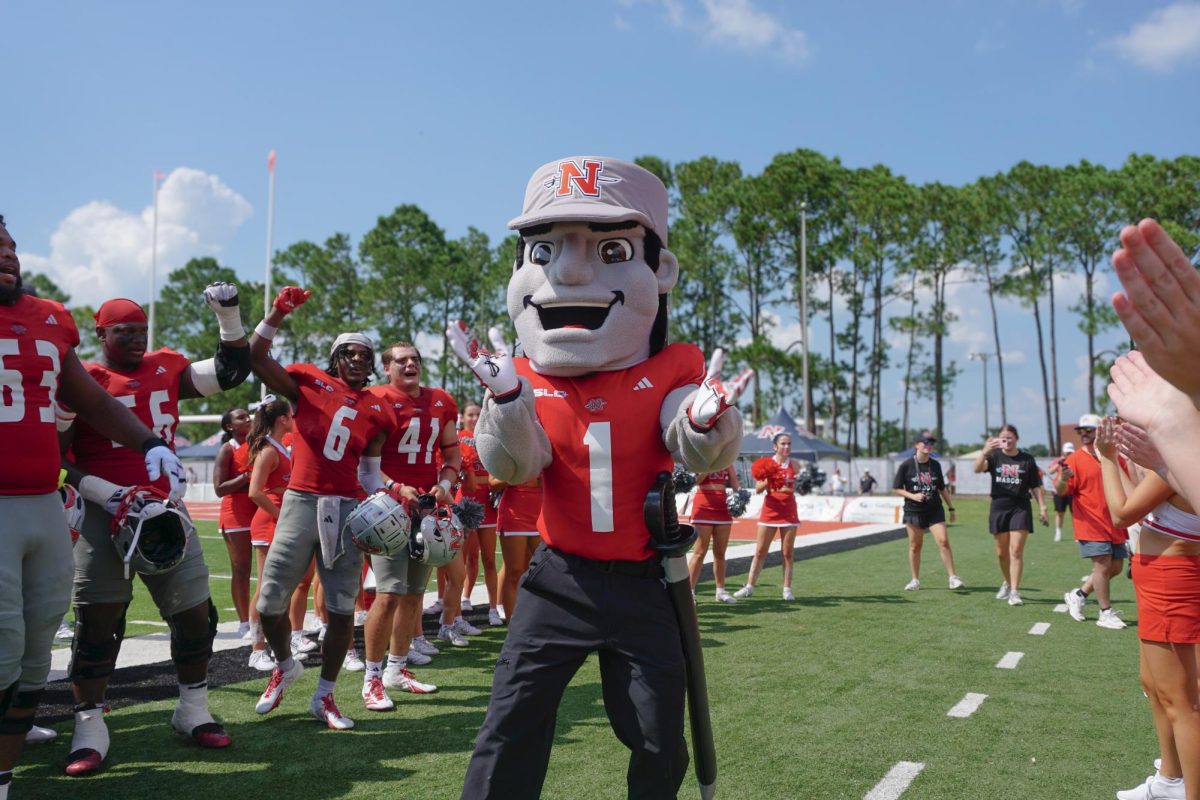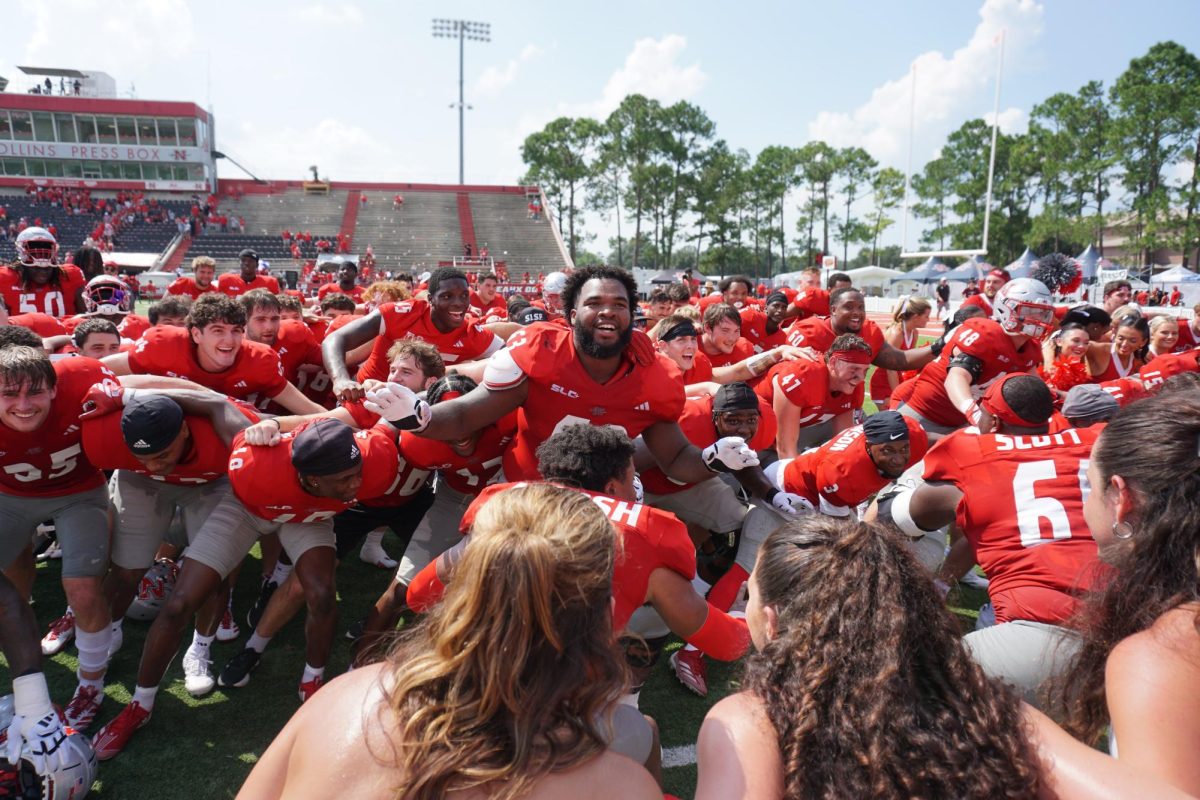Of the 254 votes cast at the University forum regarding the Colonel mascot image change controversy Monday, 182 were opposed to changing the mascot’s image, and 72 were in favor of a change. The debate topic was titled “Resolved, that Nicholls State University should change its mascot.” Adriane Brady, a general family and consumer sciences sophomore from Luling, served as main speaker for the pro side, favoring a change in the Colonel mascot. Steve Escobar, a business administration sophomore from Nicaragua, was the speaker for the con side, opposing change, and Jaret Hubbell, SGA president and psychology senior from Thibodaux, was the forum moderator.
As students sat face-to-face, separated by only their opposing views of changing the Colonel image and by a narrow walking aisle, Brady delivered her speech for the pro side, focusing on three main points: Nicholls not being a school of tradition; the mascot not fulfilling its purpose, which, according to Brady, is to create something that everyone can identify with and that creates positive momentum on campus; and Nicholls students are not reminiscent of the Old South.
“When I think of tradition, I look at Greek organizations that have practices and rituals that they have done for decades,” Brady said. “As it is now, our mascot, the Colonel, is not something that we can identify with. It’s a nineteenth-century war figure that we cannot relate to, and because of that, it’s created negative momentum.”
Escobar followed Brady, speaking on the con side. Escobar said he takes great pride in being a student at Nicholls and a Colonel. Escobar gave the audience two reasons for his disagreement with changing the Colonel image: tradition and the fact that change will not correct the problem.
“Everything is about tradition, (and) we rely on tradition as the basis for our present and our future,” Escobar said. “Tradition is good. We can propose change, but the matter of fact is that we cannot change our past. We must be proud of our University, and the Colonel is one of our biggest traditions.”
When each five-minute time period allotted to each speaker neared its completion, Brady and Escobar concluded their speeches.
Brady said: “Out mascot can in fact offend or bring back harmful memories to some people, and (for that reason) our mascot should be something people can identify with. I stand before you as a melting pot, and I can say that I personally cannot relate to the Colonel.”
Escobar said: “(The Colonel’s image) doesn’t represent racism or prejudice. If it did, I would be the first one to say, ‘Let’s change it.’ I’m Hispanic; I’m Latin. I know about racism; I know about prejudice. I wouldn’t be here if I wasn’t 100 percent sure that this is not about racism and prejudice.”
After both main speakers concluded their speeches, Hubble introduced the debate session that followed in which there would be rounds of one member from the pro audience who could voice his opinion immediately followed by a con member voicing his. Each audience speaker was given approximately 30 seconds to present his idea, and between speaking, audience members were allowed to cheer, hiss and boo.
Donell Brown, a freshman from Thibodaux on the pro side, said: “The main problem with the mascot is its color: it’s plain gray. Maybe if they put a rank on his shoulder or put some stripes on his pants, then he would be a true colonel because my uncle’s an officer in the military, and he has got a stripe on his pants and a rank on his shoulder.”
In response to a student’s comment that no one presented an example of a Nicholls’ tradition, Kamala Sons, a business administration sophomore from Bourg and on the con side, said boisterously: “You want to hear about tradition? Go down the bayou. Tradition is what you make of it; it’s not just what is. If you choose to make the decision to not go to the football games, not to participate in your school and not to back your mascot, you lost tradition.”
In response to Sons, Erika Evans, a government sophomore from New Orleans and on the pro side, said: “The problem with the whole thing is not really just the mascot, it’s the undertone of what (it stands for) to a lot of African American students. But everybody knows it’s not going to change because as long as (there are) ignorant people in the world, it’s not going to change.”
Samantha Portier, a freshman from Berwick and on the con side, stood up passionately and said: “(The Nicholls mascot) was not set up as a Confederate guy. It’s just that the teacher drew the little man, the students liked it, and they picked his colors: red and gray. What? Ya’ll want to change the colors and the name next because Francis T. Nicholls owned slaves?”
Arousing laughter in many people in the audience, Jessica Lerouge a freshman from Diamondhead, Miss., and on the pro side, said: “Everybody’s forgetting to point out that, yes, we do have a Confederate colonel mascot, and the Confederacy lost. Why bash somebody when you lost?”
Two final speakers were chosen from the audience: one from the pro side, one from the con side. After presenting their final differing opinions, the forum ended, and students were given the chance to vote pro or con upon exiting the forum.
Aaron O’Neal, a speech professor, said open tryouts for main speaking positions for the second forum of the spring semester regarding whether or not the United States should legalize gay marriage will be held on March 1 and 2 in the Department of Communicative Disorders office in Talbot Hall. Students who wish to try out but have a conflict with the given dates as well as students who have any questions about the forum should contact O’Neal in room 111 Talbot in the Department of Mass Communications or via telephone at 448-4584. This next University speech forum is scheduled for March 9.








